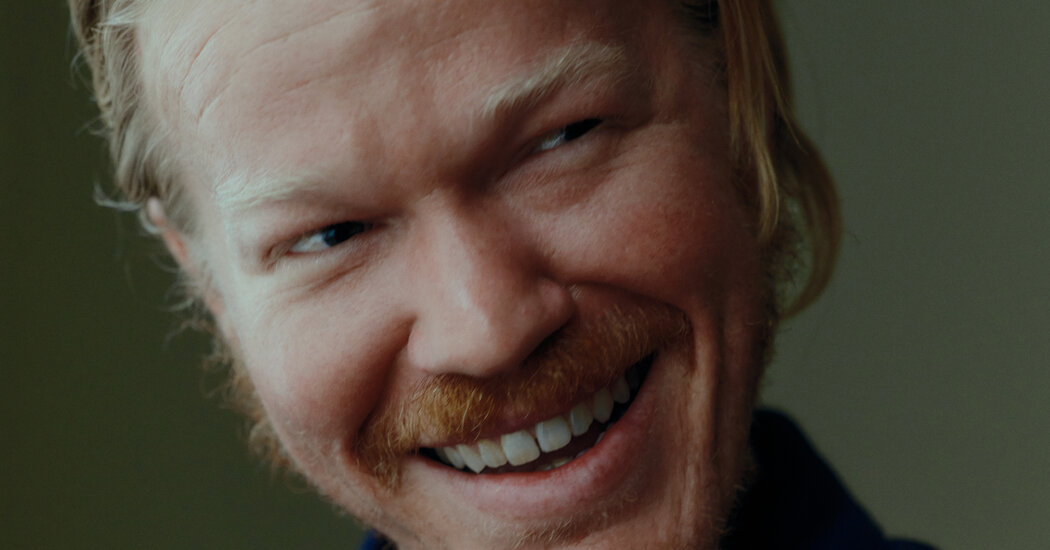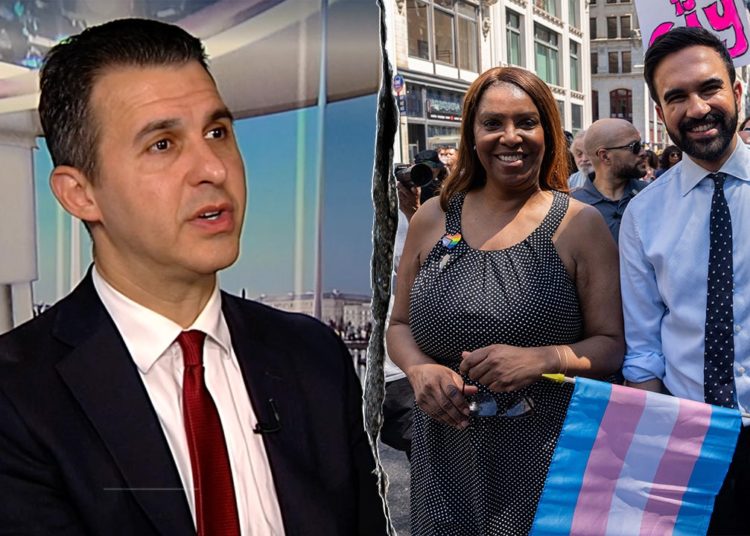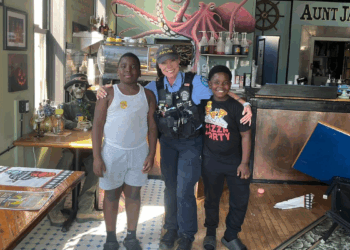After working with Emma Stone and the director Yorgos Lanthimos on last year’s dark comedy “Kinds of Kindness,” Jesse Plemons was excited to be offered a demanding lead role in their new movie, “Bugonia.” Still, he grew anxious as the film moved closer to production.
“I thought, ‘Oh, God, this is one of the best parts I’ve been asked to play. How in the world am I going to pull this off and do it justice?’” he said.
In theaters Oct. 24, “Bugonia” stars Plemons as Teddy, a disaffected loner nursing one wild conspiracy theory: He’s convinced that a pharmaceutical chief executive, Michelle (Emma Stone), is an alien hellbent on Earth’s destruction. With the help of his cousin Don (Aidan Delbis), Teddy kidnaps Michelle and holds her captive in his rundown house, where he tries to force her to confess during a series of increasingly brutal confrontations.
The movie gives Plemons one of his most significant leading roles to date, and he makes the most of it: Even when Teddy is driven to outlandish hostilities, you can sense the bruised and beating heart beneath. Previously Oscar-nominated for “The Power of the Dog,” Plemons, 37, has made memorable impressions in ensemble films like “Killers of the Flower Moon,” “The Irishman” and “Game Night,” and his latest off-kilter collaboration with Lanthimos has put him back in the awards-season mix.
“I think why I enjoy working with Yorgos so much is that you watch his movies and some of it feels like it’s not coming from a conscious brain,” he said. “It’s coming from something deep down in a collective psyche.”
I spoke with Plemons over a video call from Berlin, where he is shooting “The Hunger Games: Sunrise on the Reaping,” a prequel that casts him as a younger version of Plutarch Heavensbee, the character originally played by Philip Seymour Hoffman. In his spare time, Plemons was reading the autobiography of the psychiatrist Carl Jung, which delves into the same realms of the unconscious mind that he and Lanthimos are eager to explore.
“That’s what I think is forever fascinating to me about acting,” he said. “The human mind is a whole universe.”
Here are edited excerpts from our conversation:
It’s interesting that “Bugonia” is coming out the same year as “Eddington” and “One Battle After Another,” two other movies that speak to this polarized moment we find ourselves in.
It’s about time that it’s starting to be reflected in film, and I’ve had that feeling for a little while. I love music from the ’60s and ’70s, and during that time, even in popular music, the conversation about what was happening in the country and the world was right at the forefront. It does seem like filmmakers and artists are now at a place where you can’t deny these strange times.
Maybe, as “Bugonia” suggests, we’ve largely spent the last few years in online rabbit holes that don’t challenge our worldviews but instead reinforce them.
Totally. And that’s not to say there aren’t a lot of people out there actually trying to effect change, but I think it’s why any sort of meaningful discourse has become almost impossible. It’s like our brains have stopped working in the way where we’re able to actually listen to people without having these little spam things pop up in our head with all of these regurgitated stop signs.
What was your entry point for Teddy, who sees it as his responsibility to save the planet by any means possible?
The thing I really grew to love about Teddy is that as lost and misguided and tortured as he is, he also wears absolutely everything on his sleeve and there’s no question where he stands on any given issue. At a time where people are so afraid to voice their honest opinion, it was like being given this enormous amount of freedom.
On “Kinds of Kindness,” you said Yorgos wasn’t willing to discuss much about the script or its characters. Was this experience the same?
We didn’t do a whole lot of analyzing. Early on, we had some debates about whether Teddy was crazy or not, but beyond that, not really.
How did you calibrate that level of craziness? Teddy does have some intelligence and resourcefulness, but there’s a lack of self-awareness that makes him dangerous.
Yeah, I’ve never come across a character like him who is so brilliant but who has such a distinct Achilles’ heel. All the really dark aspects of his personality and actions aside, there are some attributes that I really respect: He’s not someone that was college-educated, and some of the information and truths that he went out and gathered, a lot of people wouldn’t agree with, but I find his conviction admirable.
To understand Teddy better, you read Naomi Klein’s book “Doppelgänger: A Trip Into the Mirror World,” which charts how people can be sucked into online conspiracy theories. What did you glean from what she wrote?
One thing she said in the book is that the initial feeling that leads people into these fringe organizations can be correct, and if they want to find a community to discuss this feeling, this fear, where do you go? With every conspiracy, there’s a little thread of truth, and it took me a little while to feel like all those theories that Teddy has were lived in enough that I could believe them as they were coming out of my mouth.
He does say some wild things, especially when he and Don have a fraught dinner-table argument with Michelle.
That scene around the dinner table, the writing was so rich and it was such a creative high to do. I think with really good writing, there are any number of variables in a take that can cause different reactions based on what the actor’s doing, based on whatever choice you are using at the beginning of that take, based on the fact that you’ve done it 10 times and you need something else to happen so it doesn’t feel stale.
For instance, in that scene, Aidan improvised, “Can I go to the bathroom?” That was not in the script, so that immediately disrupts the flow, and then the remaining part of the scene takes on a completely different energy. When there’s not some degree of that, for me, I get bored. That’s what I’m usually starved for, those moments where anything that I thought a scene might be about is turned upside down.
Tell me about working with Aidan, an autistic actor making his film debut.
I’m so proud of him and blown away by what he did in this movie. He’s only 19 now, he was 18 when we shot. He’s very self-possessed and if you phrase something in a way that doesn’t quite make sense, he will let you know. So you need to really make sure you’re saying what you mean, which is just a great exercise in general. I was amazed by his endurance. The movie’s not what it is without him, I don’t think.
What was the most difficult thing about making “Bugonia”?
At the house location, we shot chronologically for the most part. That’s always a blessing, but at a certain point, it’s just constantly escalating and going from bad to hell for Teddy. So the most difficult part of it was just the endurance that it took.
How did you feel when you wrapped?
Bittersweet, but I think I was pretty ready. It’s always surreal — it’s like your life goes on hold for this period of time and the people you’re working with kind of become your family. And I was fortunate to have my family there with me [he and Kirsten Dunst have two sons], but it’s a different kind of missing them when you’re working all the time and only seeing them for an hour or so at the end of the day.
So I felt very ready to put it down, but for a while, there was some lingering stickiness to Teddy. It wasn’t until it came out [at the Venice Film Festival] that I felt a bit of a release. It was an emotionally, psychologically demanding part, and because I don’t do all that many leads — and this was one where I was in it every day — it just takes a little time to sort itself out.
Are you the kind of person who wants the work to be that intellectually and psychologically demanding?
Oh, there’s no world where I wouldn’t play this part over and over again. This is my one job and I want to continue to get better at it. You can’t do that without parts that, at first, seem just a little out of reach.
How far into the “Hunger Games” production are you?
I’ve done my first scene and my last scene. I really love this part. This is sort of my third revolutionary in a row, which is kind of funny, and this character is very different from Teddy, but it’s a good head space to walk around in. Aside from missing my family, it’s been really great.
You’ve been compared to Philip Seymour Hoffman in the past, and worked with him on “The Master.” What was your initial reaction when they came to you for the role?
That was one of the main things to consider, knowing it was going to be a big part of the press for this movie. It’s obviously incredibly flattering — I mean, we’re very different people, we just sort of resemble each other. But that was one of the things that really conflicted me about taking this. After thinking about it and reading the book and script, I just decided, “I don’t care, I’ll figure out how to talk about it.”
I’m curious about how you’ll tackle Plutarch and this material.
I’m so not the demographic. It was really interesting finding my way in and rewatching the movies. It really wasn’t until I read the book and was able to understand all of the different terminology and the minutiae of the world that [it clicked]. But again, its themes are very relevant to the times we’re in, and there’s a hope in Plutarch that I’m appreciating.
Kyle Buchanan is a pop culture reporter and also serves as The Projectionist, the awards season columnist for The Times.
The post With ‘Bugonia,’ Jesse Plemons Takes the Lead appeared first on New York Times.




